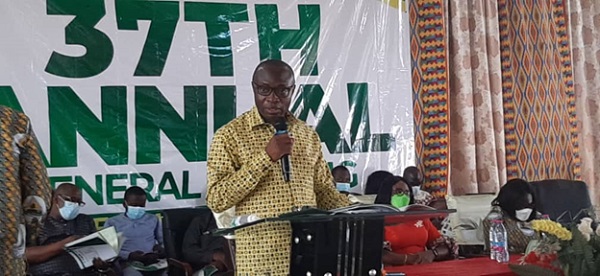Prof. Rexford Assasie Oppong
THE ASANTE Akyem Rural Bank, headquartered at Juansa in the Asante Akyem Central Municipality of the Ashanti Region, has posted a 10.53% rise in annual profit to a record GH¢290.430 million in the year 2020.
The results of the bank by market value are viewed as an indicator of the local economy despite the struggling of slowing growth by the national economy amid a global slump in commodity prices due to the COVID-19 pandemic.
The bank’s deposit also grew from GH¢45.88 million in 2019 to GH¢62.38 million in the year under review, representing an increase of 35.96%.
The Board Chairman of the bank, Prof. Rexford Assasie Oppong, said investment of the bank also saw a rise of 46.56% from GH¢25.13 million (2019) to GH¢36.83 million in 2020, while its assets grew from GH¢56.15 million in 2019 to GH¢73.29 million, a representing 30.53% increase.
He was very upbeat that the bank stands the chance to improve on its profit margin with the recovery of the national economy.
Prof. Oppong lauded the board and management of the bank for their dedication and hard work, which he said had led to the attainment of this feat, but indicated that there is more room for improvement.
He said the bank also spent a total of GH¢43,050 to undertake Corporate Social Responsibility (CSR) project to better the lives of people in its operational areas.
He mentioned the provision of 170 wellington boots, 75 knapsack spraying machines and four boxes of cutlasses, 17 veronica buckets, 100 gallons of sanitisers and support to the Otumfuo Education Foundation as some of the activities the bank undertook during the year under review.
Managing Director for the ARB Apex Bank Ltd, Alex Awuah, in an address read on his behalf, praised the Asante Akyem Rural Bank for the hard work during the financial year.
He asked the bank to concentrate on the small and medium businesses since they hold huge potential, while cautioning community and rural banks in the country not to venture into high-risk businesses so as not to lock up their capital.
BY Ernest Kofi Adu


